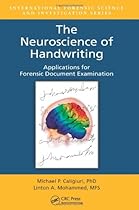The Neuroscience of Handwriting: Applications for Forensic Document Examination (International Forensic Science and Investigation)

| Author | : | |
| Rating | : | 4.88 (928 Votes) |
| Asin | : | 143987140X |
| Format Type | : | paperback |
| Number of Pages | : | 267 Pages |
| Publish Date | : | 2013-02-19 |
| Language | : | English |
DESCRIPTION:
Not the definitive word but opens new doors to the scientific process As a learning tool, this book may assist document examiners in being able to better articulate the fundamental principles and theories of our field in various ways.The aim of The Neuroscience of Handwriting, as Caligiuri and Mohammed state in their conclusion on page 205, was "not to present the definitive. printing my rating was 3 because the printing is not too much good and the book was not colured comparble with the price.
He is the current president of the American Society of Questioned Document Examiners, is a fellow in the Questioned Document Section of the American Academy of Forensic Sciences, and is currently completing work for a PhD in Human Biosciences at La Trobe University, Melbourne, Australia. He is certified by the American Board of Forensic Document Examiners and holds a Diploma in Document Examination from the Forensic Science Society in England. His research over the past two decades has focused on understanding how drugs and disease affect motor control and fine hand movements. He has served as the lead scientist on several federally and industry-sponsored studies on identifying treatment response in psychiatric patients and has authored over 100 peer-reviewed articles i
. He has served as the lead scientist on several federally and industry-sponsored studies on identifying treatment response in psychiatric patients and has authored over 100 peer-reviewed articles in medical journals and book chapters on movement disorders, brain imaging, and biomedical instrument development. Mohammed, MFS, D-ABFDE, has been a forensic do
Topics discussed include: Fundamental principles in the neuroanatomy and neurochemistry of hand motor control and their application to research in handwritingThe epidemiology, pathophysiology, and motor characteristics of neurogenerative diseases such as Parkinson’s, Huntington’s, Alzheimer’s, multiple sclerosis, essential tremor, and motor neuron disease and their effects on handwritingPsychotropic medications prescribed for depression, bipolar disorder, and psychosis; their mechanisms of action; and their effect on motor behavior and handwritingThe impact of substance abuse on handwritingAn overview of the aging process and its effects on motor control and handwritingThe kinematic appr
